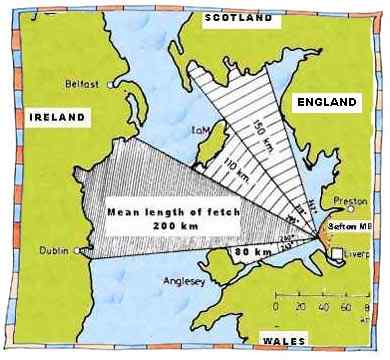
Coastal systems and processes
Why do rates of coastal erosion differ from place to place?:
Erosion accelerates during storms (mostly in winter in the UK)
Different types of rocks erode at different rates.
Climate change
Thermal expansion
Mass movement - The movement of material downhill under the influence of gravity but may also be assisted by rainfall.
Fetch - Refers to the distance of open water over which wind blows uninterrupted by major land obstacles. The length of the fetch helps determine the magnitude (size) and energy of waves hitting the coast.
Weathering - The breakdown and/or decay of rock at or near the earth’s surface creating regolith that remains in situ until it is move by later erosional processes. This can be mechanical, biological/organic or chemical.
Erosion - The wearing away of the Earth’s surface by the mechanical action of processes of glaciers, wind, rivers, marine waves and wind.
Factors that affect wave formation:
Wind
Waves in groups are called trains
The fetch
Prevailing wind

Hydraulic action - The force of water hitting a cliff or the sea floor.
Attrition - Rocks being transported hit against each other.
Abrasion - When material scrapes against the sea floor or a cliff.
Solution - Rocks are dissolved in water.
Coastal systems and processes
Why do rates of coastal erosion differ from place to place?:
Erosion accelerates during storms (mostly in winter in the UK)
Different types of rocks erode at different rates.
Climate change
Thermal expansion
Mass movement - The movement of material downhill under the influence of gravity but may also be assisted by rainfall.
Fetch - Refers to the distance of open water over which wind blows uninterrupted by major land obstacles. The length of the fetch helps determine the magnitude (size) and energy of waves hitting the coast.
Weathering - The breakdown and/or decay of rock at or near the earth’s surface creating regolith that remains in situ until it is move by later erosional processes. This can be mechanical, biological/organic or chemical.
Erosion - The wearing away of the Earth’s surface by the mechanical action of processes of glaciers, wind, rivers, marine waves and wind.
Factors that affect wave formation:
Wind
Waves in groups are called trains
The fetch
Prevailing wind

Hydraulic action - The force of water hitting a cliff or the sea floor.
Attrition - Rocks being transported hit against each other.
Abrasion - When material scrapes against the sea floor or a cliff.
Solution - Rocks are dissolved in water.
 Knowt
Knowt